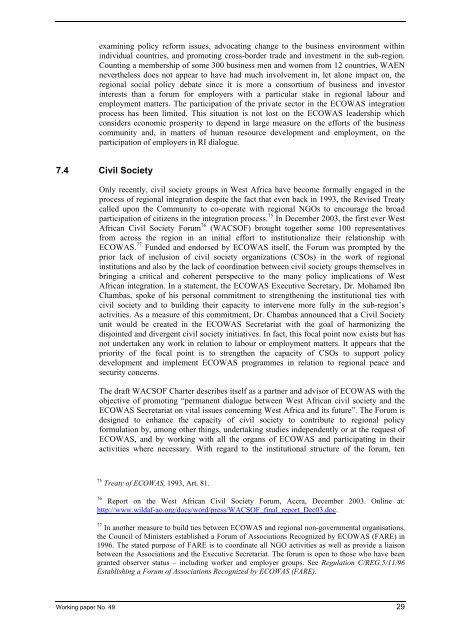The Social Dimension of Regional Integration in ECOWAS
The Social Dimension of Regional Integration in ECOWAS
The Social Dimension of Regional Integration in ECOWAS
You also want an ePaper? Increase the reach of your titles
YUMPU automatically turns print PDFs into web optimized ePapers that Google loves.
exam<strong>in</strong><strong>in</strong>g policy reform issues, advocat<strong>in</strong>g change to the bus<strong>in</strong>ess environment with<strong>in</strong><br />
<strong>in</strong>dividual countries, and promot<strong>in</strong>g cross-border trade and <strong>in</strong>vestment <strong>in</strong> the sub-region.<br />
Count<strong>in</strong>g a membership <strong>of</strong> some 300 bus<strong>in</strong>ess men and women from 12 countries, WAEN<br />
nevertheless does not appear to have had much <strong>in</strong>volvement <strong>in</strong>, let alone impact on, the<br />
regional social policy debate s<strong>in</strong>ce it is more a consortium <strong>of</strong> bus<strong>in</strong>ess and <strong>in</strong>vestor<br />
<strong>in</strong>terests than a forum for employers with a particular stake <strong>in</strong> regional labour and<br />
employment matters. <strong>The</strong> participation <strong>of</strong> the private sector <strong>in</strong> the <strong>ECOWAS</strong> <strong>in</strong>tegration<br />
process has been limited. This situation is not lost on the <strong>ECOWAS</strong> leadership which<br />
considers economic prosperity to depend <strong>in</strong> large measure on the efforts <strong>of</strong> the bus<strong>in</strong>ess<br />
community and, <strong>in</strong> matters <strong>of</strong> human resource development and employment, on the<br />
participation <strong>of</strong> employers <strong>in</strong> RI dialogue.<br />
7.4 Civil Society<br />
Only recently, civil society groups <strong>in</strong> West Africa have become formally engaged <strong>in</strong> the<br />
process <strong>of</strong> regional <strong>in</strong>tegration despite the fact that even back <strong>in</strong> 1993, the Revised Treaty<br />
called upon the Community to co-operate with regional NGOs to encourage the broad<br />
participation <strong>of</strong> citizens <strong>in</strong> the <strong>in</strong>tegration process. 75 In December 2003, the first ever West<br />
African Civil Society Forum 76 (WACSOF) brought together some 100 representatives<br />
from across the region <strong>in</strong> an <strong>in</strong>itial effort to <strong>in</strong>stitutionalize their relationship with<br />
<strong>ECOWAS</strong>. 77 Funded and endorsed by <strong>ECOWAS</strong> itself, the Forum was prompted by the<br />
prior lack <strong>of</strong> <strong>in</strong>clusion <strong>of</strong> civil society organizations (CSOs) <strong>in</strong> the work <strong>of</strong> regional<br />
<strong>in</strong>stitutions and also by the lack <strong>of</strong> coord<strong>in</strong>ation between civil society groups themselves <strong>in</strong><br />
br<strong>in</strong>g<strong>in</strong>g a critical and coherent perspective to the many policy implications <strong>of</strong> West<br />
African <strong>in</strong>tegration. In a statement, the <strong>ECOWAS</strong> Executive Secretary, Dr. Mohamed Ibn<br />
Chambas, spoke <strong>of</strong> his personal commitment to strengthen<strong>in</strong>g the <strong>in</strong>stitutional ties with<br />
civil society and to build<strong>in</strong>g their capacity to <strong>in</strong>tervene more fully <strong>in</strong> the sub-region’s<br />
activities. As a measure <strong>of</strong> this commitment, Dr. Chambas announced that a Civil Society<br />
unit would be created <strong>in</strong> the <strong>ECOWAS</strong> Secretariat with the goal <strong>of</strong> harmoniz<strong>in</strong>g the<br />
disjo<strong>in</strong>ted and divergent civil society <strong>in</strong>itiatives. In fact, this focal po<strong>in</strong>t now exists but has<br />
not undertaken any work <strong>in</strong> relation to labour or employment matters. It appears that the<br />
priority <strong>of</strong> the focal po<strong>in</strong>t is to strengthen the capacity <strong>of</strong> CSOs to support policy<br />
development and implement <strong>ECOWAS</strong> programmes <strong>in</strong> relation to regional peace and<br />
security concerns.<br />
<strong>The</strong> draft WACSOF Charter describes itself as a partner and advisor <strong>of</strong> <strong>ECOWAS</strong> with the<br />
objective <strong>of</strong> promot<strong>in</strong>g “permanent dialogue between West African civil society and the<br />
<strong>ECOWAS</strong> Secretariat on vital issues concern<strong>in</strong>g West Africa and its future”. <strong>The</strong> Forum is<br />
designed to enhance the capacity <strong>of</strong> civil society to contribute to regional policy<br />
formulation by, among other th<strong>in</strong>gs, undertak<strong>in</strong>g studies <strong>in</strong>dependently or at the request <strong>of</strong><br />
<strong>ECOWAS</strong>, and by work<strong>in</strong>g with all the organs <strong>of</strong> <strong>ECOWAS</strong> and participat<strong>in</strong>g <strong>in</strong> their<br />
activities where necessary. With regard to the <strong>in</strong>stitutional structure <strong>of</strong> the forum, ten<br />
75 Treaty <strong>of</strong> <strong>ECOWAS</strong>, 1993, Art. 81.<br />
76 Report on the West African Civil Society Forum, Accra, December 2003. Onl<strong>in</strong>e at:<br />
http://www.wildaf-ao.org/docs/word/press/WACSOF_f<strong>in</strong>al_report_Dec03.doc.<br />
77 In another measure to build ties between <strong>ECOWAS</strong> and regional non-governmental organisations,<br />
the Council <strong>of</strong> M<strong>in</strong>isters established a Forum <strong>of</strong> Associations Recognized by <strong>ECOWAS</strong> (FARE) <strong>in</strong><br />
1996. <strong>The</strong> stated purpose <strong>of</strong> FARE is to coord<strong>in</strong>ate all NGO activities as well as provide a liaison<br />
between the Associations and the Executive Secretariat. <strong>The</strong> forum is open to those who have been<br />
granted observer status – <strong>in</strong>clud<strong>in</strong>g worker and employer groups. See Regulation C/REG.5/11/96<br />
Establish<strong>in</strong>g a Forum <strong>of</strong> Associations Recognized by <strong>ECOWAS</strong> (FARE).<br />
Work<strong>in</strong>g paper No. 49 29

















